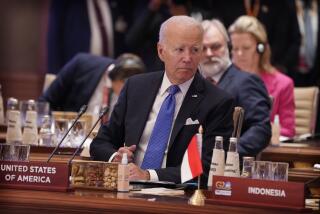Clinton Seeks Access to Technology for Poor Nations
- Share via
FLORENCE, Italy — President Clinton, who has sought to have every American classroom hooked up to the Internet by the end of next year, proposed on Sunday a vast increase in the developing world’s access to computers, cellular telephones and the World Wide Web to help jump-start struggling economies.
Citing what he said is the need to eliminate the “digital divide” between rich and poor, Clinton said: “The people in Africa are no different from the people in America. If you give people access to technology, a lot of smart people will figure out how to make a lot of money.”
He offered no specifics about how much such a boost in communications capacity would cost, who would pay for it or how long the job would take to complete.
The president spoke at a daylong international conference on the challenges of “progressive governance” in the next century.
It brought together fellow political leaders--generally, like the president, middle-aged and middle-of-the-road, but self-declared new thinkers--and academics.
Among the participants, summoned by the conference host, Prime Minister Massimo D’Alema of Italy, were Prime Minister Tony Blair of Britain, Chancellor Gerhard Schroeder of Germany, Prime Minister Lionel Jospin of France and President Fernando Henrique Cardoso of Brazil--all politicians whose younger professional lives were generally rooted in liberal or leftist approaches and who are known now for seeking to govern from centrist positions.
Their mission in Florence: trying to find ways to steer society toward new solutions for problems expected in coming decades by moving beyond well-trod routes and traditional liberal and conservative divides and embarking on what they call a Third Way.
It was all very serious--wonkish, to use a solidly American term in this city of Dante--with participants considering such topics as “Strengthening Democracy in the Global Economy” and “The Not-a-Cat Syndrome: Rethinking Human Rights Law in the 21st Century,” drawing from the 17th century French poet and writer Jean de La Fontaine to buttress one argument, and delving into the challenges of addressing pollution and human rights issues.
The program was the third in a series sponsored by New York University Law School. Clinton attended the conference last year in New York on the day the House of Representatives made public the videotapes of his grand jury testimony in the Monica S. Lewinsky case that led to his impeachment.
This was the sort of gathering on which Clinton thrives, at least by reputation, whether at the annual Renaissance Weekend at which he celebrates the new year in South Carolina, or in lengthy after-dinner conversations with a few friends. This one was held just a short walk from the Arno River.
But within the context of the broad seminars of the day, Clinton--who says he is something of a klutz when it comes to electronics, even if it’s a calculator--addressed on a global scale an idea that has intrigued him as it applies to the United States: that those who are computer-illiterate or who have little access to the most modern communications equipment face a particularly tough time achieving economic comfort now that society depends so heavily on technology.
“The people who have access to the Internet and technology have enormous advantages, and [the gap] has to be closed. We are now hooking up all of our classrooms to the Internet, and we should finish next year,” the president said.
“But,” he continued, “I think we should shoot for a goal in the developing countries [and] the developed countries of having Internet access as complete as telephone access within a fixed number of years. It will do as much as anything to reduce income inequality.”
He turned repeatedly to the subject during his multiple commentaries and interjections during the program, saying, “The more you can make dense the availability of cell phones and computers in poor countries, the bigger difference it would make.”
The meetings, held at the Palazzo Vecchio, a palace that dates to the 14th century, offered a recreation break--of Clintonesque tenor--in the diplomatic milieu of the president’s 10-day European trip, which has been focused largely on the Balkans.
At the end of the day, Clinton flew to Sofia, Bulgaria, the first American president to visit a country that was once a Balkan cornerstone of the Soviet bloc. The trip is scheduled to end Tuesday, when Clinton visits Kosovo before returning to Washington.
More to Read
Get the L.A. Times Politics newsletter
Deeply reported insights into legislation, politics and policy from Sacramento, Washington and beyond. In your inbox twice per week.
You may occasionally receive promotional content from the Los Angeles Times.










